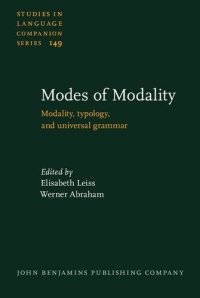
Ebook: Modes of Modality: Modality, typology, and universal grammar
Author: Elisabeth Leiss Werner Abraham
- Genre: Linguistics // Linguistics
- Tags: Языки и языкознание, Лингвистика, Грамматика (общая теория)
- Series: Studies in Language Companion Series 149
- Year: 2014
- Publisher: John Benjamins Publishing Company
- Language: English
- pdf
The volume aims at a universal definition of modality or “illocutionary/speaker’s perspective force” that is strong enough to capture the entire range of different subtypes and varieties of modalities in different languages. The central idea is that modality is all-pervasive in language. This perspective on modality allows for the integration of covert modality as well as peripheral instances of modality in neglected domains such as the modality of insufficieny, of attitudinality, or neglected domains such as modality and illocutionary force in finite vs. nonfinite and factive vs. non-factive subordinated clauses. In most languages, modality encompasses modal verbs both in their root and epistemic meanings, at least where these languages have the principled distribution between root and epistemic modality in the first place (which is one fundamentally restricted, in its strict qualitative and quantitative sense, to the Germanic languages). In addition, this volume discusses one other intricate and partially highly mysterious class of modality triggers: modal particles as they are sported in the Germanic languages (except for English). It is argued in the contributions and the languages discussed in this volume how modal verbs and adverbials, next to modal particles, are expressed, how they are interlinked with contextual factors such as aspect, definiteness, person, verbal factivity, and assertivity as opposed to other attitudinal types. An essential concept used and argued for is perspectivization (a sub-concept of possible world semantics). Language groups covered in detail and compared are Slavic, Germanic, and South East Asian. The volume will interest researchers in theoretical and applied linguistics, typology, the semantics/pragmatics interface, and language philosophy as it is part of a larger project developing an alternative approach to Universal Grammar that is compatible with functionalist approaches.
Download the book Modes of Modality: Modality, typology, and universal grammar for free or read online
Continue reading on any device:

Last viewed books
Related books
{related-news}
Comments (0)